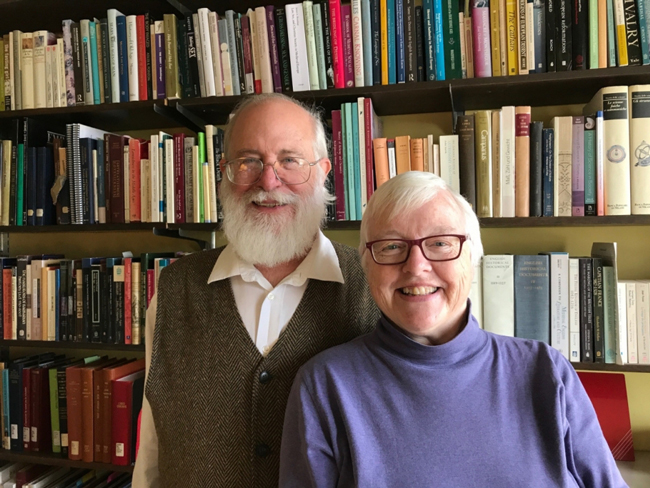
Few can say they’ve spent their entire adulthood studying and working in one place. At yet, here at McGill, we have Kendall and Faith Wallis – both multiple McGill alumni – who have called the University home for more than half a century. “We met at McGill, and it’s been our life since the mid ‘60s” says Faith, who has been a professor in the Department of History and Classical Studies since 1986. “We’re very much an oddity around here – there are not many people in my department who are McGill graduates.”
Sitting in the stark History and Classical studies faculty lounge, Faith’s enthusiasm for McGill and her chosen career bursts forth like a shower of confetti. With wildly gesturing hands, she describes her and Kendall’s life trajectory, bubbling with laughter like an over-boiling pot as she recounts her and Kendall’s off-campus encounters with students over the years.
Kendall appears to have no desire to compete with his wife’s effusiveness. He speaks quietly, and carefully, but with a twinkle in his eye. Kendall is a retired reference librarian who I recognize from my own studies at McGill a decade and a half ago – his bushy beard is and was always hard to miss. His soft-spoken manner and sparkling eyes indicate a man who has spent much of his life in quiet spaces, searching for knowledge and spreading it to cohort after cohort of students.
“He was Google before Google, basically,” says Faith, laughing, when Kendall speaks of his job at the McLennan Library. He also made a major impact on the structure of McGill libraries, fighting for the introduction of the very first liaison librarian (“in History!” adds Faith) during his time as acting McLennan Librarian, a term which lasted three years before he “went back into the trenches.”
The reason we are meeting is because the Wallises have recently created a new fund in support of graduate students in the History and Classical Studies department. With no children of their own, they decided that they wanted to do something with their money before they die. They look forward to seeing their impact, and hope to encourage others to do the same.
“We [in the Department of History and Classical Studies] are poised now, I firmly believe, to become a major venue for postgraduate training in history, on a continental scale,” says Faith. “We’ve got an amazing diversity and depth of expertise here. Plus, we’ve got the Islamic Institute, and other things like it which allow us to play a bigger game than most history departments do. And having classics and history together is an advantage as well.”
Despite this good positioning, Faith sees a major hurdle facing graduate students, especially international ones, as they are not eligible for Quebec, Provincial, or Federal funding.
“If you’re going to build a graduate program, you really have to think about deep structural commitments to funding, and being able to see students through without accumulating crippling debt for the rest of their lives.”
The History and Classical Studies Graduate Excellence Fund is the Wallis’ effort to address this problem, and they want to encourage their colleagues, alumni and any other supporters of the department to donate to it. The aim is to give students the extra funds to complete their degrees, should they need more than three years, or gain support for field research or other training such as learning a language.
“Part of this is mortar, instead of blocks,” says Kendall. “Filling in the cracks, stabilizing the structure so that students are able to go that little bit further.”
The Wallis’ enthusiasm for history is infectious, and it’s clear that this support isn’t simply about giving money to the university where they have spent most of their lives.
“It’s almost an act of citizenship too,” Faith says. “A lot of the undergraduate training in history is actually dialling up students’ bullshit meter, so that they understand the complexity of human experience and having a critical sense to see that the world is not black and white.”
But in order to help the best of those students into graduate programs at McGill, funding is absolutely vital.
“It’s so frustrating when we get applications from great students, but we can’t match the offer they got from another school because of funding. Hopefully in the future we can make a stronger case for excellent students to be able to come here.”
Faith also hopes to encourage her colleagues to derive the kind of satisfaction she and Kendall are, from giving back to the department.
“Not everybody is in our position: here we are in our late ‘60s, without children, with a mortgage paid off,” Faith says. “But my colleagues have said they would do the same with extra income [from speaking or book royalties] to give back to the program. “
“It’s little things like that which would grow the foundation of the future for the department. We do have really good undergraduates at McGill. The graduate program is good, we certainly have the teaching expertise and brains here to make it better, if we only had the funds,” Faith continues.
You can learn more about History and Classical Studies Graduate Excellence Fund at this website, or contact Scott Corbett, Arts Development Officer, for more details about making a donation.
